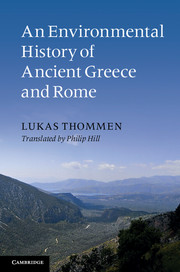Book contents
- Frontmatter
- Contents
- Figures
- Preface
- Introduction
- Part I Greece
- Part II Rome
- Chapter 11 The geographic space
- Chapter 12 People and nature
- Chapter 13 Agriculture
- Chapter 14 Forests and timber
- Chapter 15 Gardens
- Chapter 16 Animals
- Chapter 17 Food
- Chapter 18 Fire and water
- Chapter 19 Earthquakes and volcanoes
- Chapter 20 Mining
- Chapter 21 Urban problems and rural villa construction
- Chapter 22 The environment in Roman Britain
- Conclusion
- Chronology
- Further reading
- Sources
- Bibliography
- Index
Conclusion
Published online by Cambridge University Press: 05 June 2012
- Frontmatter
- Contents
- Figures
- Preface
- Introduction
- Part I Greece
- Part II Rome
- Chapter 11 The geographic space
- Chapter 12 People and nature
- Chapter 13 Agriculture
- Chapter 14 Forests and timber
- Chapter 15 Gardens
- Chapter 16 Animals
- Chapter 17 Food
- Chapter 18 Fire and water
- Chapter 19 Earthquakes and volcanoes
- Chapter 20 Mining
- Chapter 21 Urban problems and rural villa construction
- Chapter 22 The environment in Roman Britain
- Conclusion
- Chronology
- Further reading
- Sources
- Bibliography
- Index
Summary
The environmental history of antiquity covers a wide range of fields of analysis of living conditions in ancient Greek and Roman times, and can thus claim relevance for the characterisation of an entire epoch. It shows both continuity of the landscape and changes in the Mediterranean area and the adjacent regions to the north, from the early part of the first millennium bc through late antiquity in the fourth and fifth centuries ad. It leads from the modest beginnings of the world of the polis in Greece, which spread across extensive areas around the Mediterranean and Black Seas, to the Roman Empire, with its vast territorial expansion that resulted not only in the conquest of the countries bordering the Mediterranean, but also embraced areas north of the Alps, so that large portions of European territory were opened up to settlement and economic activity. This intensified settlement laid important foundations for the shaping of medieval and hence also of modern Europe. The conceptualisation of nature developed by the Greeks and Romans, and their manner of dealing with their natural environment, would also have after-effects.
A study of the environmental history of antiquity is restricted primarily by the sources, since the literary reports are limited in scope and often provide only a one-sided view of the situation; they can only partially be completed or corrected by the results of natural-scientific investigations. There are no detailed descriptions of the environment, or of environmental problems. Environment in the modern sense was only described at a general level, primarily in terms of such climatic factors as wind and water. Despite the religious respect for nature, it was always seen as a challenge to be mastered and defeated by technical means. Such threatening elements as fires, floods, earthquakes and volcanoes, and also drought and wind storms were to be brought under control. Human destruction of nature, exhaustion of resources and the harmful effects of pollution were noted and criticised, but largely as a critique of opulence, and with no clear analysis of the issues.
- Type
- Chapter
- Information
- An Environmental History of Ancient Greece and Rome , pp. 141 - 142Publisher: Cambridge University PressPrint publication year: 2012



